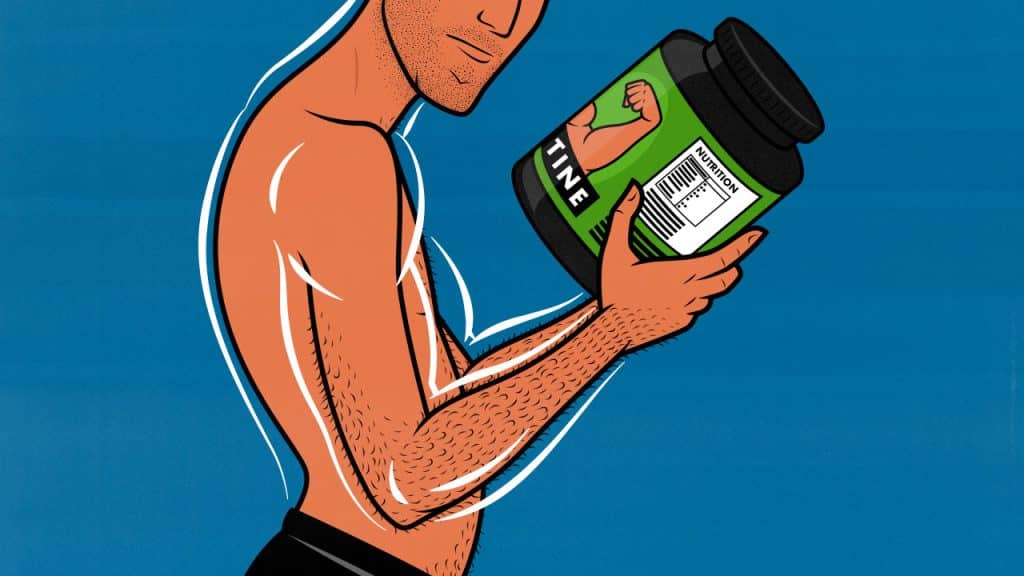
Should Skinny Guys Take Creatine to Build Muscle?
Once upon a time, I was 23 years old and 130 pounds at 6 feet tall. I was skinny and underweight, with a BMI of just under 18. I was hunchbacked from all my time spent hunched over my desk studying graphic design.
My roommate, Shane, was similarly thin, so we made a pact to bulk up together. We called it Muscle May and spent much of April preparing for it. But even before I started lifting weights or eating more food, my body was already transforming.
In preparation for the start of Muscle May, I started taking creatine monohydrate a week early. I wanted to load up on creatine beforehand so that my levels were optimized for my first workout. I mixed 5 grams of creatine into a glass of blueberry juice. The creatine was grainy but tasteless. It was the first muscle-building supplement I ever took.
By the end of the week, before I started lifting weights or eating a bulking diet, I had gained 8 pounds from creatine alone. I couldn’t believe it.
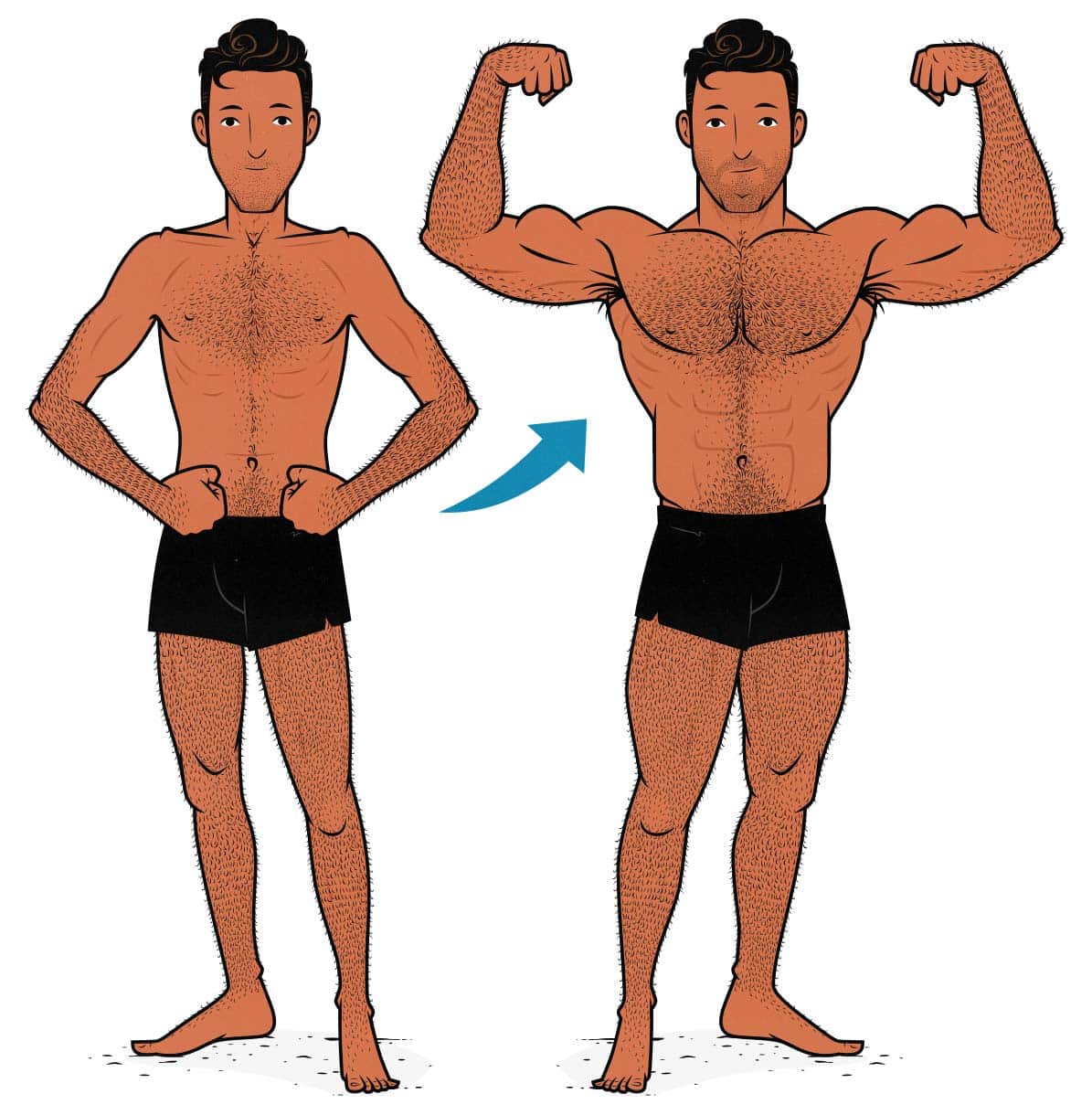
My Experience With Creatine
If you’re a skinny guy and you’re struggling to gain weight, gaining 8 pounds in a week might sound incredible—maybe even unbelievable. I gained more weight than most people, but my results weren’t unheard of. Weight gain is a common “side-effect” of creatine. It draws fluid into our muscles, making them bigger and giving them greater work capacity.
My initial success with creatine is what set the stage for our muscle-building transformations. In our four-month experiment, I gained over 30 pounds, going from skinny to fit. Shane gained 25 pounds.
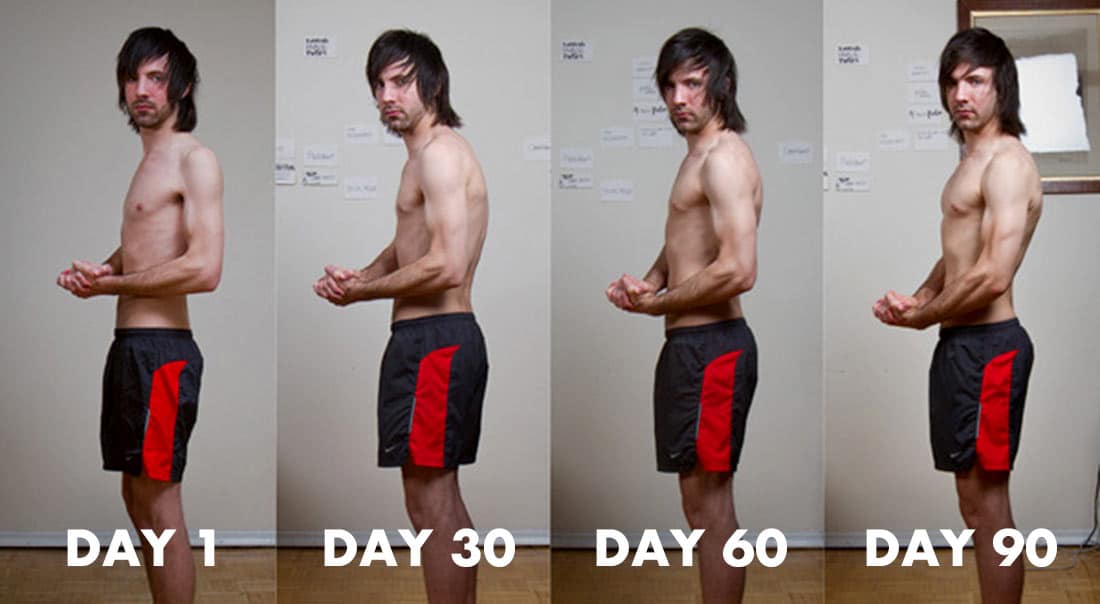
We got such good results that strangers on Bodybuilding.com were commenting that our bulking transformations must have been photoshopped. Some even accused us of using steroids. Neither of which was true. Just creatine.
Obviously, lifting weights and eating a good bulking diet gave us most of our muscle growth. Still, creatine played a meaningful supporting role.
So, what exactly is creatine? Can it help us build muscle faster? Can it help skinny guys gain weight? And if you do decide to use it, how exactly should you take it?
What Is Creatine?
Creatine is a substance we can produce in our kidneys, liver, and pancreas. We make this creatine from 3 amino acids: arginine, glycine, and methionine. We get these amino acids from the protein we eat. As long as we eat reasonably balanced diets, we can produce all the creatine we need to survive.
However, we can further increase our creatine levels by adjusting our diets or by supplementing with creatine directly.
Increasing our levels of creatine comes with a ton of benefits. In fact, studies have found creatine to be the most effective muscle-building supplement. Nothing else even comes close.
What Does Creatine Do?
When you first start taking creatine, you may gain some weight. Creatine also improves your workout performance, adding a couple of reps to your sets, allowing you to stimulate more muscle growth (meta-analysis). Perhaps most importantly for us skinny guys, it increases our rate of muscle growth by around 33%.
There’s also some preliminary research showing that creatine can help with cognition, bone density, and blood sugar regulation. However, those benefits aren’t as well studied and only apply to certain segments of the population (study, study).
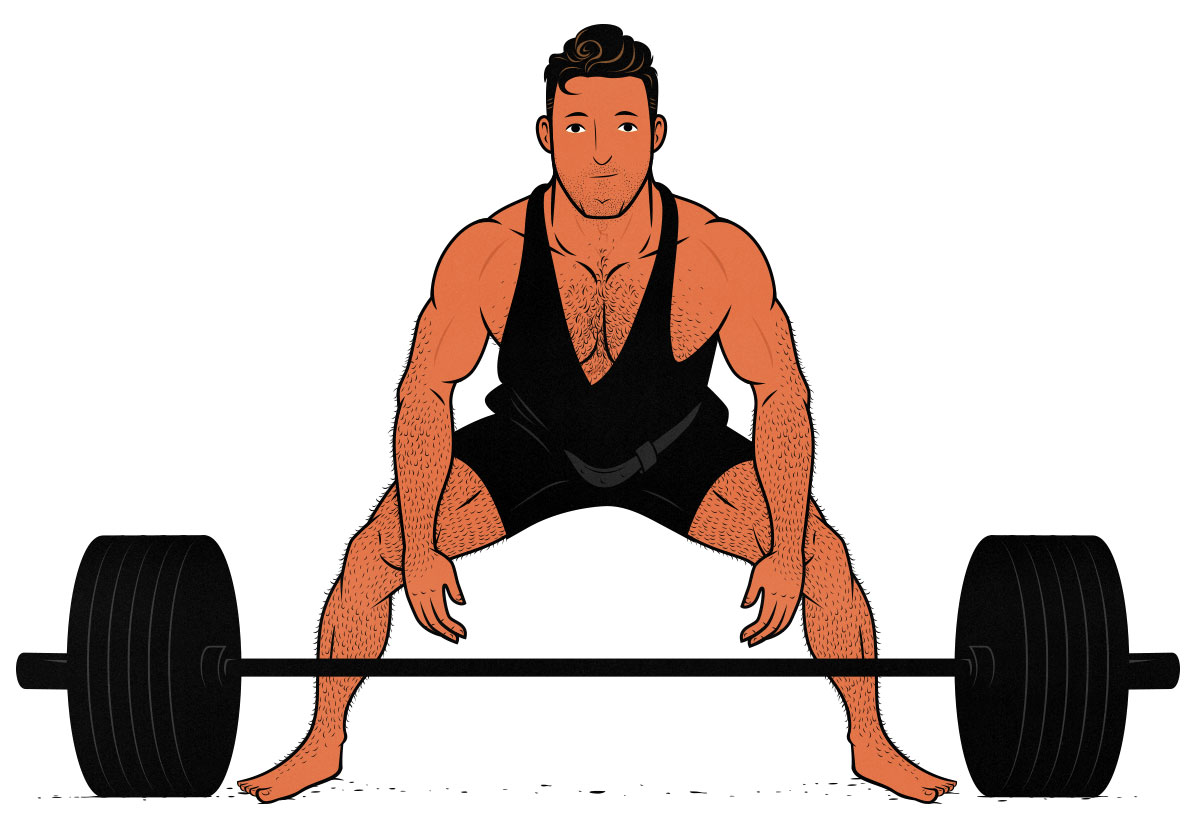
How Does Creatine Work?
When you lift weights, your muscles burn adenosine triphosphate (ATP) as fuel. When you run out of that fuel, you stop being able to do more reps, and you fail your set. While you rest, you replenish your ATP with your aerobic system, giving your muscles the fuel they need to do another set. This takes a few minutes, which is why most people rest 2–5 minutes between sets.
While you’re in the middle of a set, you can get extra ATP from creatine phosphate, powering your muscles for an extra 10 seconds or so. Supplementing with creatine gives you more creatine phosphate, potentially allowing you to contract your muscles for a few more seconds.
You can also break down glycogen in the middle of a set, converting the sugar into fuel. This can fuel a couple of minutes of effort, making it extremely useful when lifting in a moderate rep range. However, it produces lactic acid as a byproduct, which is why higher-rep sets make your muscles burn.
So if you supplement with creatine, you can get more reps per set, increasing your training volume, thus allowing you to stimulate more muscle growth.
Plus, having extra fluid in your muscles may increase muscle-protein synthesis, allowing creatine to increase your rate of muscle growth in a second way (study).
The Side Effects of Creatine
Creatine is a normal part of a healthy body and diet. We naturally produce it from the protein we eat. We also eat creatine itself when we consume meat and fish.
Supplementing with creatine is different and could potentially have its own side-effects, but it doesn’t seem to. After reviewing thousands of creatine studies, The Journal of the International Society of Sports Nutrition concluded that supplementing with creatine is safe and healthy (meta-analysis).
The only known negative side-effect of creatine is stomach cramping. This can happen when you take too much creatine with too little fluid. To solve it, you can split your dose of creatine in half and/or mix it into a larger quantity of fluid.
Who Should Take Creatine?
Skinny Guys Who Want to Build Muscle
Creatine is an extremely effective supplement for bulking up. Creatine can help you lift heavier weights, lift those heavier weights more times, and reduce your risk of injury while doing it. Given that its main “downside” is bulkier muscles, well, this isn’t even a problem for skinny guys—it’s a benefit. So it’s only upsides for us. This is why it’s one of our core Beastly supplements, at the top of our list of recommended bulking supplements. (Here’s our article about the other best bulking supplements and how to take them.)
Vegans and Vegetarians
Creatine is a plant-based, vegan supplement. However, the best dietary sources of creatine are red meat and fish. That seems to explain why vegans tend to have lower levels of creatine. It also means that supplementation offers a greater benefit (study).
Studies have found that strength is correlated with how much creatine is in your muscles, so going from lower-than-average to higher-than-average can greatly improve your workout performance.
If your diet is lower in creatine, your body must pick up the slack by trying to synthesize extra. That isn’t necessarily a problem, but supplementing with it might free up some extra amino acids for building muscle (study).
For more, here’s our article about how to bulk on a plant-based diet.
Older Weight Lifters
Creatine is good for building muscle, and muscle is especially important for older people. Most research shows that people can build muscle quite well up until 60 or 70 years old, after which it becomes harder.
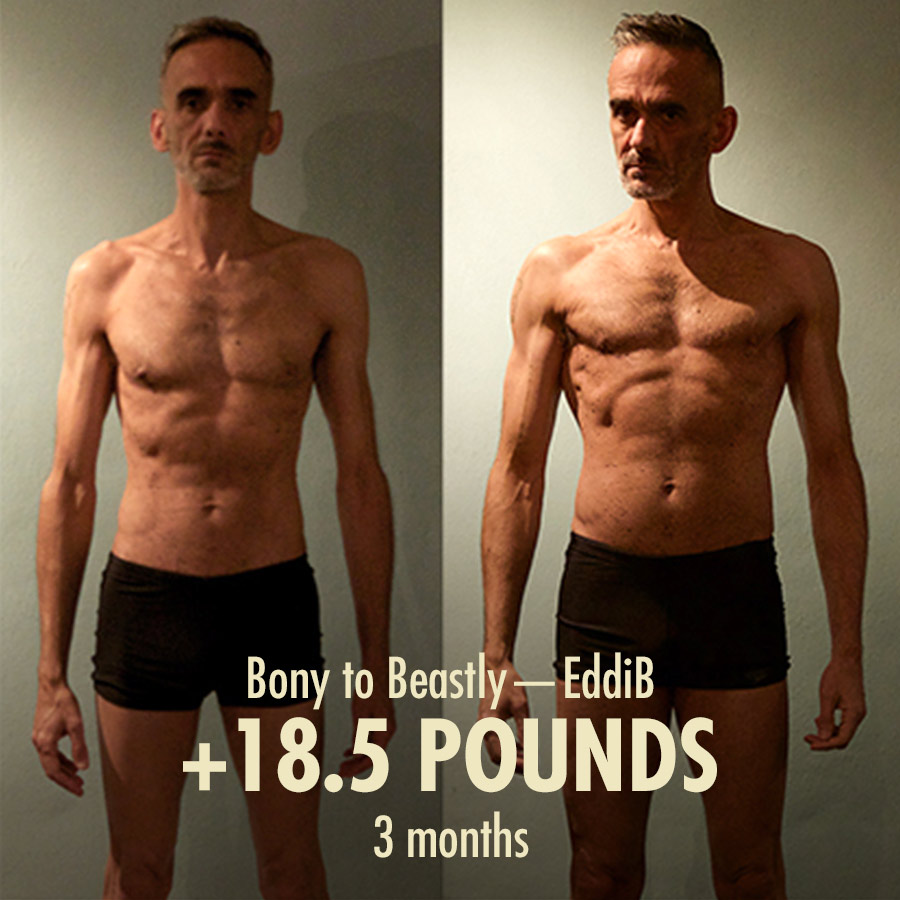
Older people who lift weights for a year gain around 3 more pounds of muscle if they supplement with creatine (meta-analysis). Creatine can also help older people gain strength, avoid injuries, and recover faster (study, study, study, study).
Adults Who Want to Be Bigger & Stronger
Creatine is the best supplement for gaining strength and muscle. It can also improve sports performance if your sport favours bigger people, stronger people, or demands 1–3 minutes of intense effort from your muscles.
If you want to be bigger and stronger for any reason, creatine is probably a good supplement for you. Mind you, weight training, eating a good diet, and getting enough rest is even more important. Creatine is effective, but it isn’t magic.
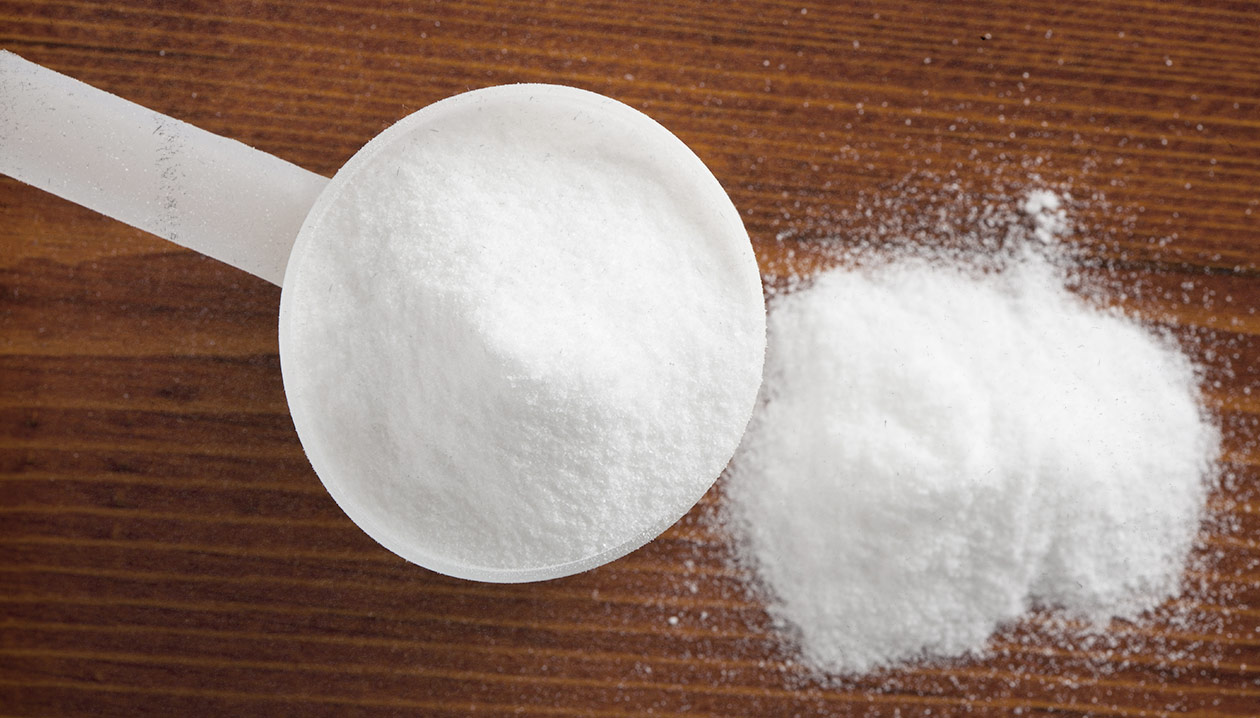
How To Use Creatine
The Best Type of Creatine
Creatine monohydrate is the most extensively studied type of creatine. It’s safe, and it’s just as effective as all the other newer types. In fact, it’s sometimes even more effective than the fancier types of creatine. For example, creatine ethyl ester performed worse.
Creatine monohydrate is also the cheapest form of creatine. Not that cheapness should play a role in how you should select the supplements you’ll be ingesting, but it when the most effective type of creatine also happens to be the cheapest, it’s definitely worth mentioning.
Is Micronized Creatine Better?
“Micronized” means to break something into very fine particles. Regular creatine monohydrate is grainy, settling at the bottom of the glass like sand underneath the waves that lap on the beach. Micronized creatine is finer, dissolving into the water like salt.
Micronized creatine isn’t any better or worse for building muscle. However, you won’t need to swirl the glass quite as much before taking your final swig.
How Much Creatine Should You Take?
When I first started supplementing with creatine, I did something called a “loading phase,” when I spent a week taking 5 grams of creatine 4 times per day. The idea was to fully saturate my muscles in a week instead of a month.
Loading phases are fine, but more recent research hasn’t found any advantage to them. Taking 5 grams of creatine per day seems to work just as well. It’s also easier, cheaper, and less likely to upset your stomach.
We recommend taking 5g of creatine monohydrate every day.
When Should You Take Creatine?
You don’t need to take creatine at a specific time of day. As you get into the habit of taking it, your muscles will slowly become saturated with it, giving you a lasting benefit.
Researchers like to surreptitiously mix creatine into people’s morning coffee. It produces great results. Many gym bros buy pre-workout supplements with creatine in them, having it before they work out. That works just as well.
We recommend having it first thing in the morning, mixed into a tall glass of water. That way, it’s easier to build a daily habit, and there’s less chance of it causing stomach upset.
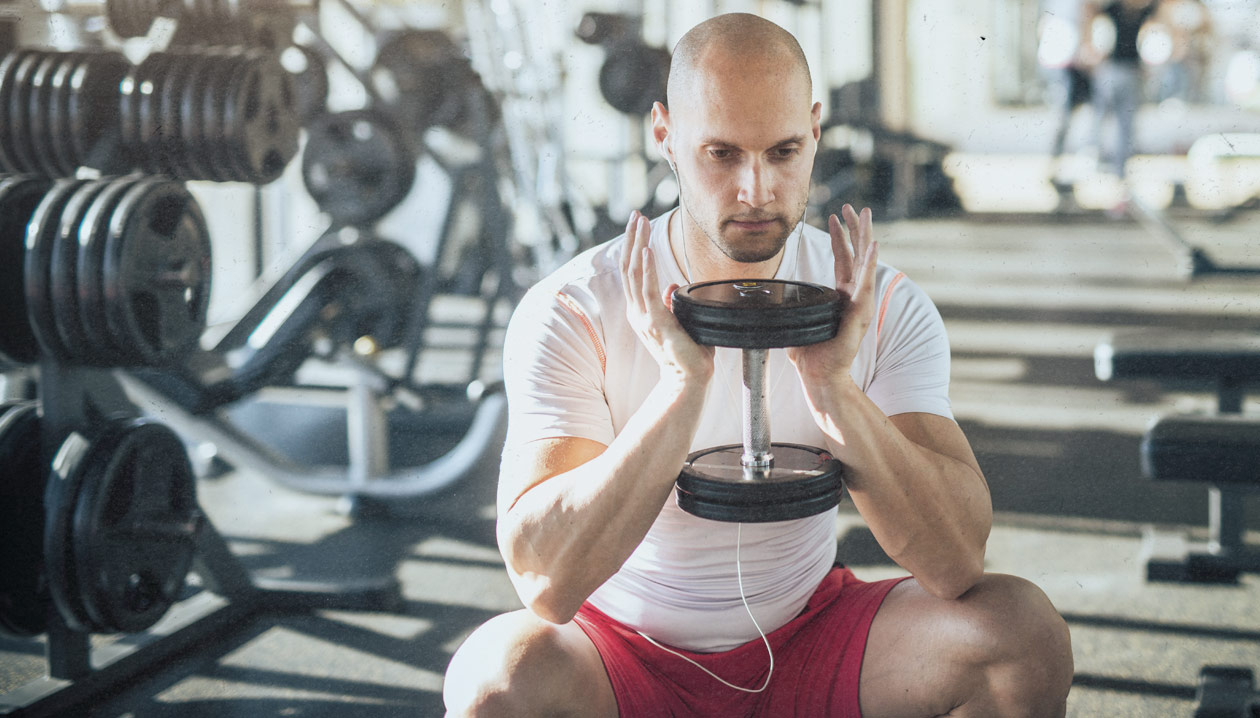
Frequently Asked Questions
Does Creatine Cause Weight Gain?
Creatine causes weight gain. When you start supplementing with it, your creatine levels will rise, causing you to retain more fluid (study). By the time your muscles are saturated with creatine, you may have gained a few extra pounds.
In my case, during my first week of taking creatine, I gained 8 extra pounds. Mind you, I was skinny, I hadn’t been eating a good diet, and I had an extreme response. I think my levels of creatine were unusually low. Most people gain half as much weight as I did. Some people gain nothing. Shane gained nothing.
If you combine creatine with an effective workout program and a good muscle-building diet, it will speed up your rate of muscle growth. Creatine seems to increase muscle growth by around 30%, so if you would have gained 10 pounds of muscle over the next few months, the creatine will add an extra 3 (study).
Should You Take Creatine While Cutting?
Creatine improves workout performance and increases muscle growth. That’s just as important while cutting as while bulking.
If you take creatine while losing weight, it should help you burn more fat and keep more muscle.
Does Creatine Cause Hair Loss?
There’s a rumour that creatine causes balding. The rumour originated from a study on rugby players that found increased dihydrotestosterone (DHT) in those supplementing with creatine (study). DHT is a masculinizing hormone, and higher levels of it are associated with male pattern baldness (study).
However, the study on rugby players didn’t find a link between creatine and balding. They weren’t even measuring hair loss. Plus, DHT remained within the normal range, which shouldn’t affect the rate of hair loss anyway.
Perhaps most importantly, further research has failed to find a link between creatine and DHT, removing the potential way in which creatine could cause balding.
Does Creatine Affect Testosterone?
Two randomly controlled studies found that creatine slightly increases testosterone (study, study). These increases aren’t significant enough to have any impact on muscle growth, though, if they even exist at all.
Creatine doesn’t improve muscle growth by increasing testosterone. Rather, it improves muscle growth by improving ATP regeneration and pulling more fluid into our muscles.
If you’re interested in increasing your testosterone, we have a guest post on testosterone written by Dr. Bhavsar. He explains how to improve your testosterone production by exercising, eating a good diet, and getting enough sleep.
What Happens When You Stop Taking Creatine?
One study found that when people stop taking creatine, they keep all the extra muscle and strength they gained while supplementing with it (study).
However, if you aren’t supplementing with creatine, your creatine levels will slowly fall back down to normal. You’ll lose the performance-enhancing and muscle-building benefits of having higher creatine levels.
What Are The Best Natural Sources of Creatine?
Meat tends to be the richest natural source of creatine. We can also make creatine ourselves by having enough of the three amino acids: arginine, glycine, and methionine. But still, most of our creatine comes from dietary sources, and meat and fish are the richest in it.
The best sources of creatine in foods are fish, beef, pork, turkey, and chicken, as shown in this chart:
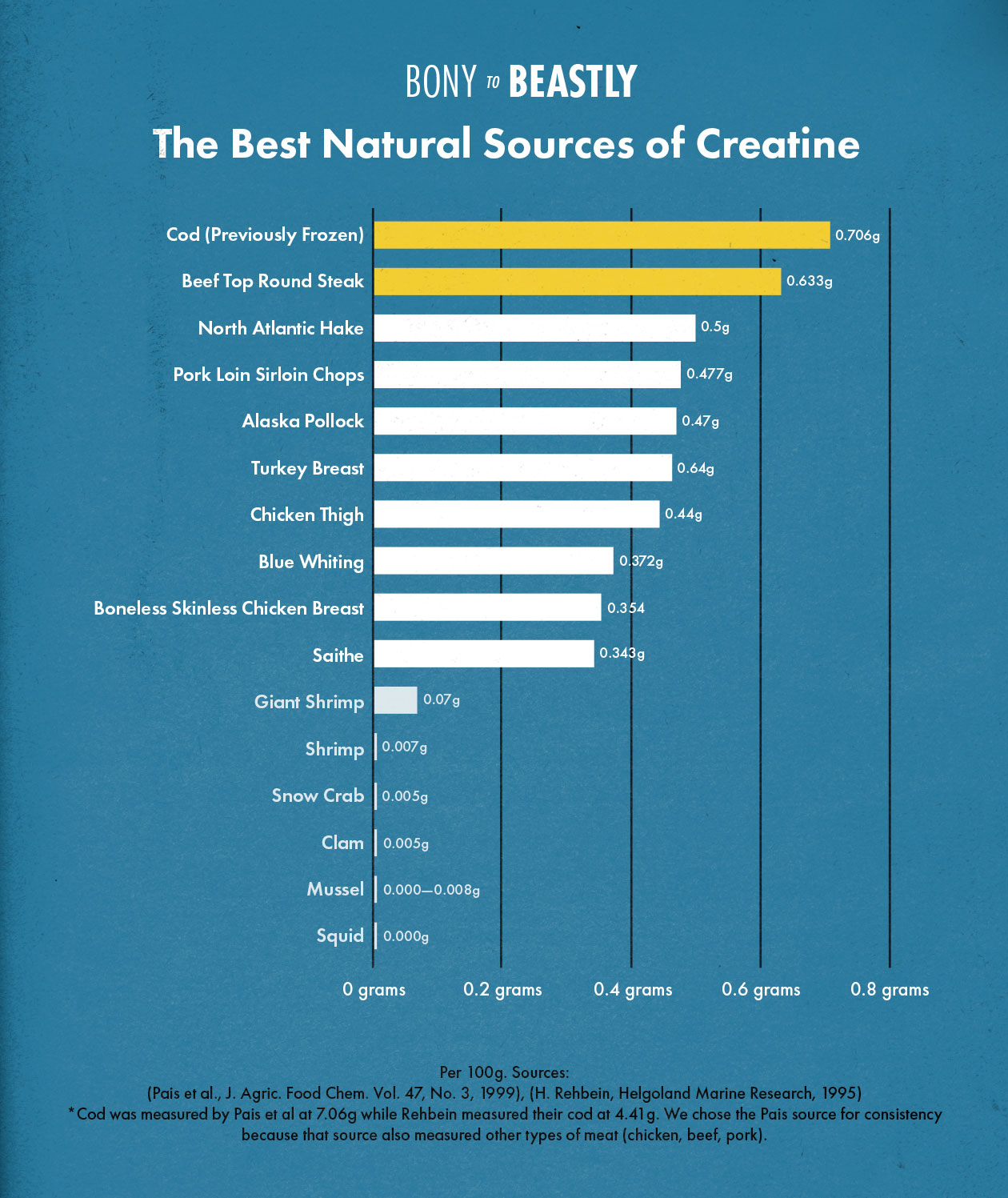
For example, if you ate 225 grams (8oz) of cod for dinner, you could potentially get an additional 1.5 grams of creatine. Some of that creatine is broken down in the cooking process, but much would survive. It might be enough to slightly raise your levels of creatine.
Overall, it would be hard to get enough creatine from food to rival the amount of creatine you can get from creatine supplements. On the other hand, some people naturally produce or consume enough creatine to fully saturate their muscles. For them, creatine supplements do nothing. (Shane seems to be one of those guys.)
What’s the Best Brand of Creatine?
We have a subscription to ConsumerLab, which runs independent testing of all the top supplement brands. As of 2023, they recommend Bulk Supplements’ creatine monohydrate, saying they offer high-quality creatine at the best price. Optimum Nutrition’s creatine came in at number two, with similar quality at a slightly higher price.
Conclusion
Creatine is the most powerful muscle-building supplement. It allows your muscles to generate fuel more quickly, improving weight training performance, sports performance, strength gains, and muscle growth. It increases muscle growth by around 30%.
Creatine is considered safe by the Journal of the International Society of Sports Nutrition.
If you decide to use creatine, mix 5 grams of creatine monohydrate into a tall glass of water. Drink that glass of water first thing every morning.

Alright, that’s it for now. If you want more muscle-building information, we have a free bulking newsletter for naturally thin guys. If you want our foundational bulking program, including a 5-month full-body workout routine, diet guide, recipe book, and online coaching, check out our Bony to Beastly Bulking Program. Or, if you want a customizable intermediate bulking program, check out our Outlift Program.

